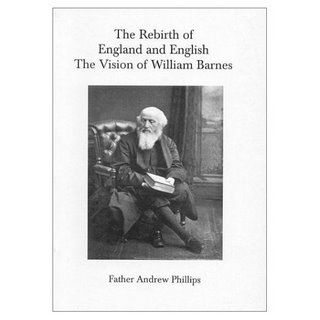The Rebirth Of England and English, The Vision of William Barnes

This lovely and loving little book by Father Andrew Phillips is a short biography of the 19th century linguist and polymath William Barnes (1801-1886), often called the Dorset Poet.
One of Barne's pet projects was a dictionary of Anglo-Saxon (Olde Englisc) words. This dictionary also listed neologisms - words that do not exist in modern English but which might have existed had the Anglo-Saxon influence on English continued until the present. After the Battle Of Hastings (1066 AD) the French assumed the aristocracy and the English language became heavily influenced by French. Barnes himself lived in rural England in an area that retained a heavily Anglo-Saxon flavor even into the 20th century.
These neologisms are speculative of course - but wonderful speculation. Here are some of Barne's neologisms for those who wish to speak of modern things as the Anglo-Saxons might have spoken had King Harold II carried that fateful day in 1066.
Modern English - Modern Anglo-Saxon
____________ ________________
aristocracy - atheldom
astrology - starwrit
bilingual - twyspeeched
biology - lifelore
choreography - dancecraft
fallacious - flawsome
FAX machine - farprinter
modernise - benew
telephone - farspeaker
television - farseer
urbanize - betown
1 Comments:
I know that Fr Andrew is big on a 'Saxon Orthodox' idea in which the virtuous Orthodox Anglo-Saxons were overrun by the no-longer-Orthodox papal (RC) Norman French. (A theory shot with holes BTW - Harold Godwinson, the last Anglo-Saxon king of England, was half-French and grew up there.) Be that as it may, I've seen Barnes referred to before, I think in Robert MacNeil's The Story of English; thanks for the reminder!
I like to say, based on Beowulf for example, that if the Normans hadn't invaded, English today would be a lot like and perhaps mutually intelligible with Dutch, its nearest sister in the Germanic family of languages today. Which would have made it partially mutually intelligible with German and the Scandinavian (Nordic) ones. (The English and the Vikings could roughly understand each other.) Much more so than now.
I think Barnes' work shows that's true.
Even though its vocabulary was heavily gallicised (of course the mediæval royals spoke French and the official language of the English courts of law was bad French - 'law French' - until about the late 1600s) English remains a Germanic language of course but one markedly different to the others (so mutual intelligibility is largely lost), a Germanic tongue that often sounds like it's trying to be a Romance one.
Then there was Channel Islands French, which survived at least through the 1800s. (The islands politically aren't part of the UK, are geographically closer to France and are ruled by the Sovereign under her title of 'Duke of Normandy' - they're the last bit of Normandy, of France, she still owns. Germany occupied them during WWII. They also were, until very recently, feudal!) It's now extinct but some enthusiasts are trying to revive it. Google and ye shall find. It's interesting to read, a reminder that the Normans were themselves Germanic (Nordic, Vikings) before they were French. Channel Islands French, I assume pronounced much like it's spelt where it differs from standard French, reads like French with a Germanic accent! (You see 'th' for 'r' a lot.)
The Orkney Islands off Scotland were part of Norway until about the 1400s and their Norn language, a Scandinavian one, survived until about the 1700s. You can still hear some of it in the islands' dialect of English.
Post a Comment
<< Home